- Home
- Medical news & Guidelines
- Anesthesiology
- Cardiology and CTVS
- Critical Care
- Dentistry
- Dermatology
- Diabetes and Endocrinology
- ENT
- Gastroenterology
- Medicine
- Nephrology
- Neurology
- Obstretics-Gynaecology
- Oncology
- Ophthalmology
- Orthopaedics
- Pediatrics-Neonatology
- Psychiatry
- Pulmonology
- Radiology
- Surgery
- Urology
- Laboratory Medicine
- Diet
- Nursing
- Paramedical
- Physiotherapy
- Health news
- Fact Check
- Bone Health Fact Check
- Brain Health Fact Check
- Cancer Related Fact Check
- Child Care Fact Check
- Dental and oral health fact check
- Diabetes and metabolic health fact check
- Diet and Nutrition Fact Check
- Eye and ENT Care Fact Check
- Fitness fact check
- Gut health fact check
- Heart health fact check
- Kidney health fact check
- Medical education fact check
- Men's health fact check
- Respiratory fact check
- Skin and hair care fact check
- Vaccine and Immunization fact check
- Women's health fact check
- AYUSH
- State News
- Andaman and Nicobar Islands
- Andhra Pradesh
- Arunachal Pradesh
- Assam
- Bihar
- Chandigarh
- Chattisgarh
- Dadra and Nagar Haveli
- Daman and Diu
- Delhi
- Goa
- Gujarat
- Haryana
- Himachal Pradesh
- Jammu & Kashmir
- Jharkhand
- Karnataka
- Kerala
- Ladakh
- Lakshadweep
- Madhya Pradesh
- Maharashtra
- Manipur
- Meghalaya
- Mizoram
- Nagaland
- Odisha
- Puducherry
- Punjab
- Rajasthan
- Sikkim
- Tamil Nadu
- Telangana
- Tripura
- Uttar Pradesh
- Uttrakhand
- West Bengal
- Medical Education
- Industry
AI effectively detects interval breast cancer in subsequent two years post-screening by mammograms: Study

Turkey: A recent study published in Clinical Radiology has shown the potential of artificial intelligence (AI) in detecting interval cancers (ICs) in the initial mammograms and lowering errors and undetected cancers.
"Artificial intelligence can detect interval breast cancer that may often be overlooked," the researchers from Turkey wrote in their study.
Prof. Levent Çelik, MD, from Maltepe University Hospital and Erkin Aribal, MD, from Acibadem University, both in Istanbul, Turkey, found that AI was implemented into breast cancer screening in a middle-income country, it achieved high specificity and sensitivity in detecting interval cancers that were labeled initially as BI-RADS 1 or 2.
Previous studies have shown the efficacy of AI in reducing interval cancers, identifying between 12% and 50% of these cancers. The level of success depends on the thresholds chosen for the technology’s implementation.
Middle-income countries comprise 108 countries with a gross national income per capita ranging from $1,136 to $13,845. These countries contribute about 30% to the global gross domestic product (GDP) and constitute about 75% of the world's population.
Against the above background, the study was conducted to investigate the accuracy and efficiency of an AI algorithm (Transpara v1.6, ScreenPoint Medical) in detecting interval cancers in a middle-income country national screening program.
The study included data from 2,129,486 mammograms reported as BI-RADS 1 or 2. These were matched with the national cancer registry for interval cancers. The interval group comprised 406, while a control group comprised 446 women with two negative consequent mammograms, defined as time-proven normal.
The cancer risk scores were issued on a one-to-10 scale, with 10 indicating extremely elevated risk. The researchers also employed specificity thresholds of 90% and 95% for the system.
The study led to the following findings:
· AI labeled 53% of ICs with the highest score of 10. The sensitivity of AI in detecting ICs was 53.7% and 38.5% at specificities of 90% and 95%, respectively.
· AUC of AI in detecting major signs was 0.93 with a sensitivity of 81.6% and 72.4% at specificities of 90% and 95%, respectively and minor signs were 0.87 with a sensitivity of 70% and 53% at a specificity of 90% and 95%, respectively.
· In subgroup analysis for time to diagnosis, the AUC value of the AI system was higher in the 0-6 month period than in later periods.
In conclusion, AI has the potential to enhance screening mammogram outcomes, specifically in countries with limited resources, by reducing human errors and detecting more undepictable cancers with the expense of a possible higher recall rate.
"It is necessary to conduct additional real-life studies to determine the appropriate approach for using suitable AI algorithms in national screening programs," the researchers wrote. "Such studies can help optimize strategies utilizing AI and human readers."
Reference:
DOI: https://doi.org/10.1016/j.crad.2024.03.012
Dr Kamal Kant Kohli-MBBS, DTCD- a chest specialist with more than 30 years of practice and a flair for writing clinical articles, Dr Kamal Kant Kohli joined Medical Dialogues as a Chief Editor of Medical News. Besides writing articles, as an editor, he proofreads and verifies all the medical content published on Medical Dialogues including those coming from journals, studies,medical conferences,guidelines etc. Email: drkohli@medicaldialogues.in. Contact no. 011-43720751


